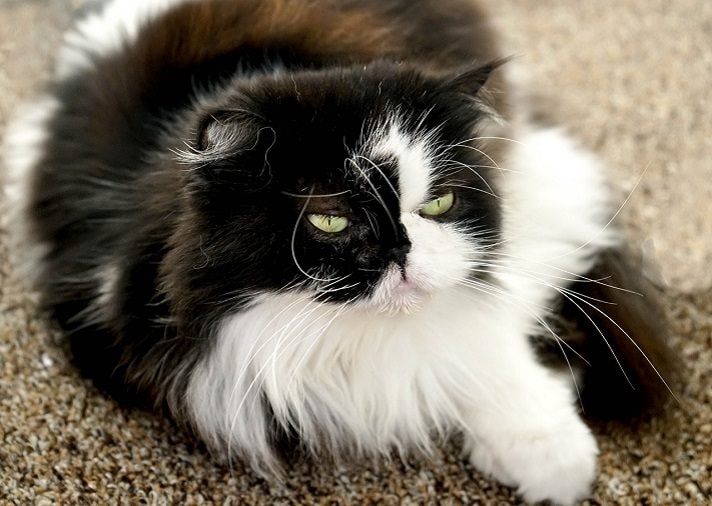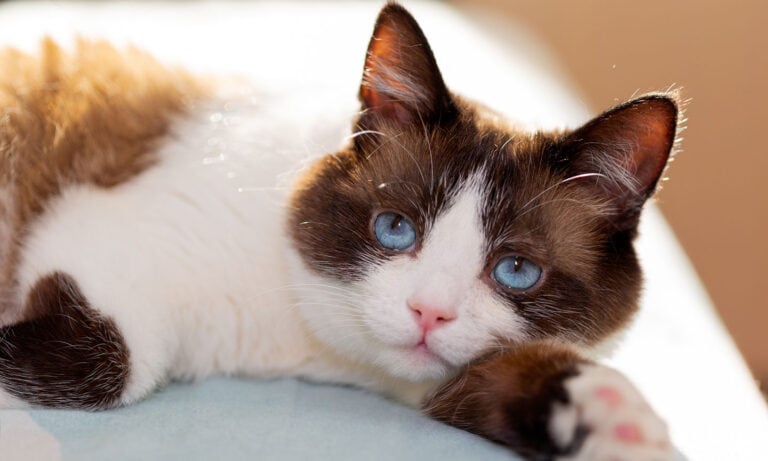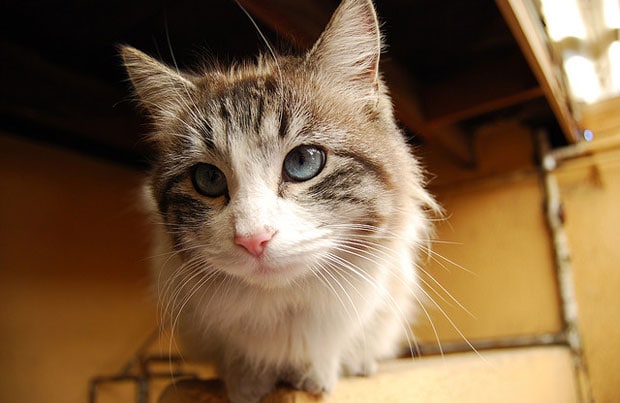Persians’ personalities precede themselves. Few owners of these gentle cats report bad behavior, instead citing serene temperaments and dignified demeanors. They grace homes with their calm presence, showing off their unsurpassed beauty at any chance they can get.
“They do tend to be — as a whole — a more laid back, gentle breed than others,” Cook Henry says. “I wouldn’t consider Persians to be a feisty breed. But that’s not to say that they don’t have individual or quirky personalities, because they do.”
Despite their passive personas, Persians are cats after all, and they can display normal feline behavior gone wrong, such as, jumping on the counter, play fighting and furniture scratching, which can frustrate any pet owner. You can correct these bad habits, however, if you address them when your Persian is a kitten or young cat. You can then be assured of a harmonious life with your little angel.
Pay Attention To Me!
Annoyance behaviors, such as jumping on the counter and excessive meowing, begin when your Persian wants your attention.
“Annoyance behaviors tend to be attention-seeking behaviors, so it’s important to give your cat attention in a good way,” says Terry Marie Curtis, D.V.M., MS, Dipl. ACVB, a clinical behaviorist at the Department of Small Animal Clinical Sciences at the University of Florida College of Veterinary Medicine in Gainesville. “That means playing with your cat and providing an outlet for all of its energy.”
Because of their body mass and shorter legs, most Persians pass on counter surfing, preferring a sunlit windowsill to a breakfast bar. But occasionally, cats like Flip hop up on the counter to get attention. Cook Henry corrects Flip by catching her in the act.
“All I have to do is say, ‘Flip,’ and she jumps right off,” she says.
Flip knows better, so Cook Henry doesn’t need to use correction tools or deterrents, such as, a spray bottle or sticky paper on the countertop. But those methods work well for Persians that don’t respond to verbal commands or misbehave when their humans aren’t around to correct them.
“If your cat is jumping on the counters and you don’t want it to, you can put double-sided tape on the counter or set up a motion detector,” Dr. Curtis says.
Katherine A. Houpt, V.M.D., Ph.D., Dipl. ACVB, an instructor at the College of Veterinary Medicine Animal Behavior Clinic at Cornell University in Ithaca, New York, suggests Persian owners place a water-filled cookie sheet on the counter or use a motion-sensor, compressed-air device that hisses at the cat when it jumps where it shouldn’t.
“I like the motion sensor best, because it doesn’t hurt the cat, but it really seems to scare them,” she says.
Though they usually aren’t overly vocal, a Persian that meows at night or early in the morning could mean that it wants some food, but if the cat bowl is full and it just wants attention, ignore it. If you refuse to respond, the cat will learn that meowing will get it nowhere.
“The most important thing is to ignore your cat when it meows, once you’ve made sure that everything’s okay,” Dr. Curtis says. “Otherwise, the cat will learn that this is a reliable way of getting your attention. Cats are very smart this way!”
As adorable as your Persian may be, resist the temptation to pick it up and cater to its every meow.
“The main thing is not to respond to it,” Dr. Houpt says. “If the kitten meows 20 times and you pick it up, next time it’ll meow 50 times.”
No Fighting Or Biting
Humans delight in playing with their Persian kittens, and this often includes play fighting with their hands. Doing so only encourages biting and scratching when the kittens are adults, Dr. Curtis says.
“It isn’t a good idea to play with a kitten using your hands and feet,” she says. “It may be cute when the kitten is small, but that same cuteness can be scary when the cat is grown and has a full set of teeth and nails! The cat won’t know why the game has changed.”
Instead, use toys to play with your Persian, Dr. Houpt says. “It’s fine to let them play fight with a toy, but not with your hands,” she says. “If they start biting or scratching your hand, just try to hold still, and then stop playing with them so their punishment is five minutes of no attention. It’s called negative reinforcement, so it’s not going to make the cat afraid of you.”
As a kitten, your Persian needs to learn to submit to its human caretaker, Cook Henry says. Because they require daily grooming, Persians must be taught to rest quietly and not to fight or bite the hands that comb them.
“Teaching a Persian to lie calmly on its back while you’re grooming its underside is very important,” she says. “They need to learn that from a very early age. From the time our kittens were 4 or 5 weeks old, we started to bathe them and turn them over on their backs.”
It’s natural for cats to play and treat human hands like prey. But let your Persian know that grooming time is not playtime.
“The best way to discourage it is a quick tap on the nose or the mouth with a finger, and a strong, ‘No’ so that they learn,” Cook Henry says. “They need to be told that that isn’t acceptable. If they turn right around and try to do it again, give them another tap and reinforce with the word, ‘No.’ Cats will learn very quickly the word, ‘No.’”
Kittens often play stalk, too. They hide behind a chair and seize their humans’ ankles or legs when they walk by.
“In cases of play-motivated aggression, the cat tends to take a stalking stance and pounce on its victim as it’s moving around,” Dr. Curtis says. “Many owners feel awful and think their cats hate them, but in fact the opposite is true — the owner is the funnest thing around!”
Discourage this, Dr. Houpt says, by correcting the behavior and providing the right toys.
“There’s the predatory play where the cat lies in wait for you and then pounces out,” she says. “That’s one situation where you can scare the kittens or make a loud noise to correct the behavior. Try to make sure that you have enough predatory toys, such as fishing poles with feathers at the end.”
Humans who use toys to interact with their kittens teach them to be well-mannered adult cats.
“I highly encourage people with Persians or any breed to interact a lot with their cats,” Cook Henry says. “They have to have playtime, and know when it’s time to play and when it’s not.”
Marking Gone Wrong
A normal activity no matter the age, Persians scratch to groom their claws and to communicate with other cats.
“It’s part of grooming behavior, serving to loosen the old layers of the claw and to hone the claw to a sharp point,” Dr. Curtis says. “It’s also part of marking behavior, serving to provide a visual cue and an olfactory cue to other cats.”
You can discourage unwanted scratching by keeping your Persian’s nails clipped and manicured, Dr. Curtis says.
“An important part of preventing scratching problems is keeping the cat’s nails trimmed,” she says. “Other options include various types of nail caps, but I don’t recommend that a cat be declawed. It’s a very invasive procedure whereby the entire first bone of each toe is removed.”
Cook Henry keeps her cats’ nails trimmed, and all her furniture and carpeting remains intact.
“Our cats don’t do damage because we keep their toenails clipped,” she says. “That’s the best defense. We don’t advocate declawing, but we certainly advocate clipping the nails and really advise owners to become familiar with it. Keep those claws short so that even if they tried to scratch on the furniture, they can’t do any damage.”
You can also provide appropriate scratching surfaces and teach your Persian to use them. Both Dr. Houpt and Dr. Curtis recommend stable vertical or horizontal scratching surfaces, and they encourage cat owners to experiment with different surfaces to determine which substrate their Persians prefer.
“Not all surfaces appeal to all cats, so it can be a process finding out which substrate is most desirable,” Dr. Curtis says. “There are vertical options, such as cat condos and cat trees, real tree trunks and door hangers. Horizontal options include corrugated cardboard and woven welcome mats. Whatever the option, it’s important that the scratching substrate be offered to the cat in an area where it spends a lot of its time.”
If your Persian refuses to use the scratching surfaces provided and chooses a rug or piece of furniture, for example, Dr. Curtis says to mimic the texture and the density of the substrate (carpet, for instance), and offer it in a suitable manner, such as, wrapped around a wooden post.
Reasons for social scratching differ between kittens and adult cats, Dr. Houpt says. Kittens use their claws as a part of playing; adults scratch to mark their territory.
“Adult cats scratch furniture as marking, so they’ll scratch prominent pieces of furniture,” she says. “Kittens tend to run up the curtains, and that’s just part of play. It drives humans crazy, but that behavior will eventually go away.”
Giving your Persian a tall cat condo to climb on will satisfy that urge to run vertically up draperies and bed linens. Toys will divert their attention away from the forbidden areas and keep their little minds busy.
“Cats can’t have too many toys,” Dr. Houpt says. “Cat condos are a good idea, so the cat can run up something with impunity.”
You can control improper marking and scratching by making the inappropriate surfaces aversive, Dr. Curtis says.
“This can be done by using double-sided tape on the arms of furniture, aluminum foil covering various items, and motion detectors that let out a sound when the cat gets too close to a particular place,” she says.
A Lifetime Of Good Manners
Sharing your life with a Persian can be a rewarding experience, even if your cat doesn’t behave like a perfect little angel. As with raising any pet, challenges will come and go, and you can face them with a little tolerance.
“I encourage owners to be very patient and understanding, and quite often the behavior will fix itself,” Cook Henry says.
Encourage good behavior, too, Dr. Curtis says. Reward your Persian for playing with appropriate cat toys by giving it praise and attention. Give treats when your Persian scratches in the right place.
“Set the cat up for success,” she says. “Offer the kitten legal toys and places to scratch. It’s best to reward kittens and cats for the behavior you want instead of punishing the behavior that you don’t want.”
By: Wendy Bedwell-Wilson
Featured Image: Mariamichelle/Pixabay
Share:









